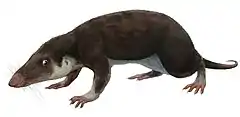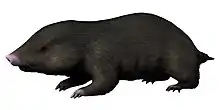| Trucidocynodon Temporal range: Late Triassic, | |
|---|---|
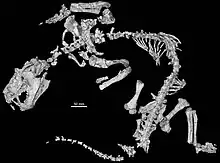 | |
| Holotype skeleton UFRGS PV-1051-T | |
| Scientific classification | |
| Domain: | Eukaryota |
| Kingdom: | Animalia |
| Phylum: | Chordata |
| Clade: | Synapsida |
| Clade: | Therapsida |
| Clade: | Cynodontia |
| Family: | †Ecteniniidae |
| Genus: | †Trucidocynodon Oliveira et al. 2010 |
| Species: | †T. riograndensis |
| Binomial name | |
| †Trucidocynodon riograndensis Oliveira et al. 2010 | |
Trucidocynodon is an extinct genus of ecteniniid cynodonts from the Upper Triassic (Carnian) of Brazil.[1] It contains a single species, Trucidocynodon riograndensis. Fossils of Trucidocynodon were discovered in outcrops of the Upper Santa Maria Formation in Paleorrota Geopark Agudo. Trucidocynodon is one of the most completely known Triassic cynodonts, as its holotype is a nearly complete and fully articulated skeleton.[1]
Description
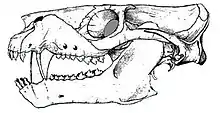
T. riograndensis was a carnivorous cynodont closely related to Ecteninion lunensis and Diegocanis eleganus, from the Upper Triassic Ischigualasto Formation of Argentina. It differed from other ecteniniids in several respects, including its larger size. The holotype skeleton has a skull around 18.8 centimetres (7.4 inches) in length and a total body length of around 1.2 metres (3.9 feet).[1] The holotype, UFRGS PV-1053-T, is accessioned at the Federal University of Rio Grande do Sul (UFRGS) alongside four paratypes based on postcranial fossils.[1] A second skull was described in 2018 from the same site. This referred skull, CAPPA/UFSM 0029, was 17% larger than that of the holotype. Trucidocynodon is considered one of the largest known carnivorous cynodonts from the Triassic, as well as one of the largest probainognathians in the entire Mesozoic.[2]
Paleobiology
A biomechanical study has argued that Trucidocynodon not only had erect limbs, but that it also possibly had digitigrade forelimbs, being among the first synapsids to show adaptations for cursoriality. However, it was likely not a specialized runner, unlike ungulates and some other modern cursorial mammals.[3]
Gallery
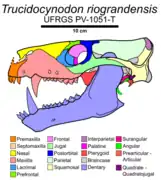 Skull diagram with bones labelled
Skull diagram with bones labelled Life restoration
Life restoration
See also
References
- 1 2 3 4 Oliveira, T.V.; Soares, M.B.; Schultz, C.L. (2010). "Trucidocynodon riograndensis gen. nov. et sp. nov. (Eucynodontia), a new cynodont from the Brazilian Upper Triassic (Santa Maria Formation)". Zootaxa. 2382: 1–71. doi:10.11646/zootaxa.2382.1.1.
- ↑ Stefanello, Micheli; Müller, Rodrigo Temp; Kerber, Leonardo; Martínez, Ricardo N.; Dias-Da-Silva, Sérgio (2018-08-09). "Skull anatomy and phylogenetic assessment of a large specimen of Ecteniniidae (Eucynodontia: Probainognathia) from the Upper Triassic of southern Brazil". Zootaxa. 4457 (3): 351–378. doi:10.11646/zootaxa.4457.3.1. ISSN 1175-5334.
- ↑ Téo Veiga, De Oliveira; Leandro Schultz, Cesar (2016). "Functional morphology and biomechanics of the cynodont Trucidocynodon riograndensis from the Triassic of Southern Brazil: Pectoral girdle and forelimb". Acta Palaeontologica Polonica. 61 (2): 377–386. doi:10.4202/app.00171.2015.
External links
- Folha: Grupo acha fóssil de superpredador gaúcho com 220 milhões de anos (in Portuguese)
- Ciência Hoje:A nova fera do Rio Grande do Sul(in Portuguese)




